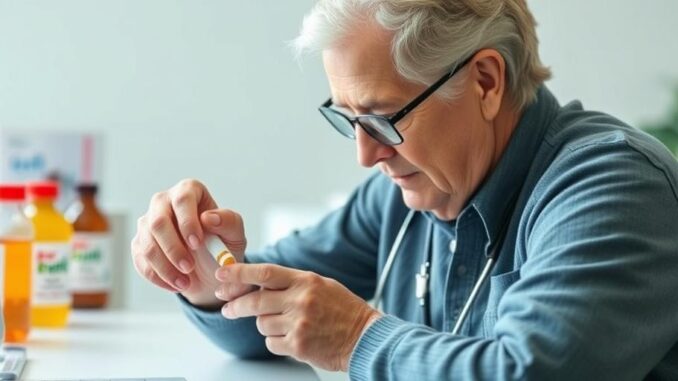
Summary
New research indicates that administering blood pressure medication at bedtime offers no significant advantage over morning dosing for frail elderly individuals. While previous studies suggested potential cardiovascular benefits with bedtime dosing, this latest trial found no difference in major health outcomes. Surprisingly, bedtime dosing resulted in fewer unplanned hospital and emergency department visits.
Reliability and uptime matter in healthcare TrueNAS provides 24/7 support when it counts.
** Main Story**
So, there’s been some buzz about when’s the best time for older folks to take their blood pressure meds. Turns out, it’s not as clear-cut as we thought, especially when we’re talking about frail, elderly patients. New research from the ESC Congress 2024 is shaking things up a bit, and it kinda makes you rethink what you thought you knew.
For years, the idea was that taking these meds at night was somehow better. The thinking was it lined up with our natural blood pressure rhythms. But these BedMed and BedMed-Frail trials? They’re suggesting maybe not. The trials looked at primary care patients and nursing home residents and didn’t see a huge difference in cardiovascular events or mortality, regardless of when they took their meds.
Now, this goes against some of the earlier studies, like MAPEC and Hygia. Those seemed to show real cardiovascular benefits from bedtime dosing, which included a drop in cardivascular events. But hey, science evolves, right? This new research seems to be backing up another study, BedMed, which also didn’t find a real advantage to nighttime dosing in general.
The BedMed-Frail Trial: What Did They Really Find?
Alright, let’s dig into that BedMed-Frail trial. We’re talking about 776 frail, elderly patients in Canadian nursing homes. That’s an average age of 88, pretty advanced. They tracked these patients for just over a year – around 415 days. And guess what? No major difference in heart stuff, deaths, falls, fractures, even cognitive decline whether they took their meds at night or stuck to the morning.
Interestingly enough, there was a slight dip in unplanned hospital visits and emergency room trips with nighttime dosing. But it wasn’t statistically significant, so, you know. The researchers are basically saying that when it comes to frail, elderly folks, the timing of these meds might not matter as much as we thought. Should we, therefore, be simply asking the patient what they would prefer? Patient preference and convenience should be a priority.
But Why Bedtime Dosing, to Begin With?
So, what’s all this fuss about timing? Well, our blood pressure isn’t static. It dips at night and then rises when we wake up. Nighttime readings are also supposedly better at predicting heart problems. The idea was that popping those pills before bed could lower blood pressure even more at night, and that, in turn, might help prevent issues.
Prior studies seemed to support that theory. But these BedMed-Frail results? They’re suggesting that maybe that benefit doesn’t translate to the frail elderly. The trial’s researchers acknowledge that not seeing a significant difference throws a wrench in the old understanding. This is why, they suggest, that we should prioritize patient preference. Makes sense, doesn’t it?
What Does This Mean for Geriatric Care?
This research is pretty important for how we handle geriatric care. It really drives home the idea of individualizing treatment plans. We can’t just apply a blanket rule. We need to think about each patient’s needs and what works best for them.
Plus, it’s a reminder that medicine isn’t set in stone. New studies constantly challenge our assumptions. What we thought was gospel yesterday might be outdated tomorrow.
The Future is Tech: Advancements in Geriatric Care
While the timing debate is interesting, remember that geriatric care is moving forward in leaps and bounds, especially with technology. Think about wearable health devices, telemedicine, medication management systems, all the way to smart home tech, and remote monitoring. All of which, are changing the game for older adults.
These things are opening up new ways to improve senior health, boost independence, and give caregivers and doctors real-time health data. I think of my own grandma, who uses a smartwatch to track her steps and heart rate. It gives her a sense of control and keeps her active.
As tech keeps evolving, its role in geriatric care will probably explode. It’s not just about blood pressure. It’s about preventing falls, supporting cognitive health, and even keeping seniors socially engaged. All of which promise a better future for geriatric care, one where older adults can live healthier, more fulfilling lives. I for one, can’t wait.


The finding that fewer unplanned hospital visits occurred with bedtime dosing, even without significant cardiovascular benefits, raises interesting questions about medication adherence and lifestyle factors in frail elderly populations. Perhaps further research could explore the correlation between dosing time and patient compliance.
That’s a great point! Medication adherence and lifestyle factors are definitely key. The dip in unplanned visits with bedtime dosing, despite no cardio benefit, suggests that convenience and routine play a big role, especially for frail elderly patients. Exploring that link further sounds like a valuable avenue for future research!
Editor: MedTechNews.Uk
Thank you to our Sponsor Esdebe
Given the surprising result of fewer unplanned visits with bedtime dosing, could this suggest a need to further explore the impact of medication timing on caregiver burden and its potential influence on hospitalization rates within frail elderly populations?